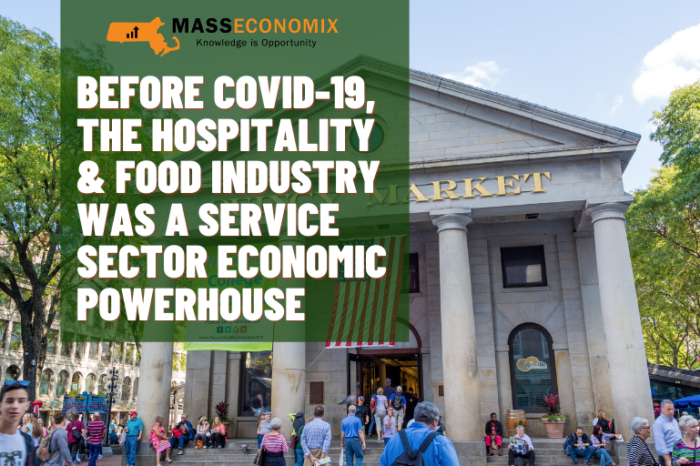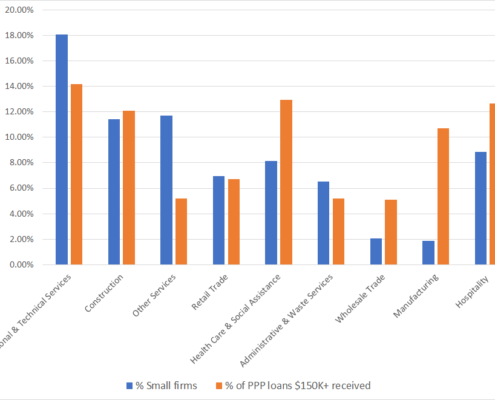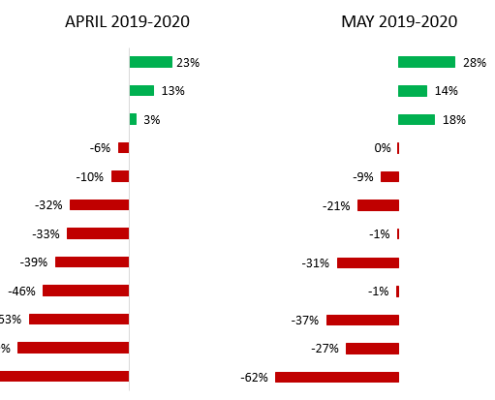Pioneer Report Highlights Pre-Pandemic Employment Growth in Massachusetts’ Hospitality & Food Industry
BOSTON – In the lead-up to the COVID-19 crisis, the Massachusetts Hospitality and Food Industry enjoyed generally positive employment growth, according to a new report from Pioneer Institute that draws data from the MassEconomix web tool. Most of the Hospitality and Food Industry employment across the state is concentrated in full-service restaurants and hotels.
“Unsurprisingly, the predominant industry employers in 2018 were large, casual chains like Dunkin’ Donuts, McDonald’s, and Starbucks,” said Pioneer Research Assistant Andrew Mikula, who co-authored the report with Serena Hajjar. “That said, most individual establishments in the industry have fewer than 10 employees, and are a vital economic component of the communities they serve.”
In “Before COVID-19, the Hospitality & Food Industry was a Service Sector Economic Powerhouse,” data spanning two decades from 1998 through 2018 show fluctuations in employment, firm size, and the share of businesses within the Hospitality and Food Industry throughout Massachusetts. The report even shows a map of employment concentration in the Hospitality and Food Industry by town.
The concentration of Hospitality and Food Industry establishments is uneven. While tourist enclaves like Cape Cod and the Berkshires are noticeably more reliant on restaurants and hotels for economic activity than most of Massachusetts, 13 rural communities in Western Massachusetts have no businesses in this industry at all. On the county level, Nantucket has the most Hospitality and Food businesses per capita, while Worcester County has the fewest.
Although the total number of both employees and business establishments in the industry has steadily increased from 1998 to 2018, shutdowns associated with the COVID-19 pandemic have the potential to radically alter these trends.
“The Hospitality and Food Industry has been front and center in the COVID-19 economic fallout, and this report offers key insights about which regions and sub-sectors will continue to be most adversely affected,” said Mikula.
All the reports in Pioneer’s MassEconomix series use the same Your-economy Time Series data to develop aggregated numbers for statewide growth. These data are recorded by Infogroup and compiled by the Business Dynamics Research Consortium (BDRC) at the University of Wisconsin System Institute for Business and Entrepreneurship in Madison, Wisconsin.
The report is the second in a series that presents employment and business establishment trends in the Commonwealth’s industries, using Your-economy Time Series data to release regular publications that create “snapshots” of particular industries and geographies.
About the Authors
Andrew Mikula is a Research Assistant at Pioneer Institute. Mr. Mikula was previously a Lovett & Ruth Peters Economic Opportunity Fellow at Pioneer Institute and studied economics at Bates College.
Serena Hajjar is the Roger Perry Government Transparency Intern at the Pioneer Institute, focusing on the effects of the coronavirus response on the state economy, emerging industries, and tax structures. Ms. Hajjar is a recipient of the Fulbright English Teaching Assistant Grant to Russia for the 2020-21 cycle. She has a B.A. in international relations and Russian and Eastern European studies from the University of Pennsylvania.
Mission
Pioneer Institute develops and communicates dynamic ideas that advance prosperity and a vibrant civic life in Massachusetts and beyond.
Vision
Success for Pioneer is when the citizens of our state and nation prosper and our society thrives because we enjoy world-class options in education, healthcare, transportation and economic opportunity, and when our government is limited, accountable and transparent.
Values
Pioneer believes that America is at its best when our citizenry is well-educated, committed to liberty, personal responsibility, and free enterprise, and both willing and able to test their beliefs based on facts and the free exchange of ideas.
Get Updates on Our Economic Opportunity Research
Related Posts:



















